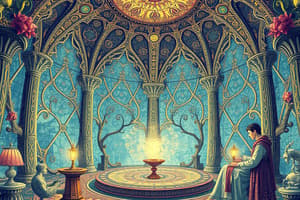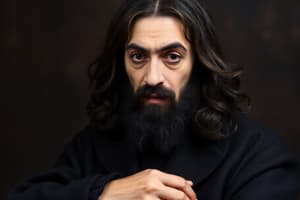Podcast
Questions and Answers
What influenced the modern turn? Select all that apply
What influenced the modern turn? Select all that apply
- An enthusiasm to apply aspects of the ‘new science’ (a post-Galileo science) toward all aspects and methods of human knowledge (correct)
- The turn to ‘consciousness’ or ‘subjectivity’ (correct)
- The emergence of Renaissance Humanism (correct)
- A new boldness of thought that deviated from a Scholastic commitment to authority (correct)
- A disillusionment with teleology (correct)
What is the “Cartesian Theater”?
What is the “Cartesian Theater”?
The Cartesian Theater refers to the idea of the mind as a self-contained inner realm, or arena, where all of our experiences take place. This concept was introduced by Rene Descartes and emphasizes the subjective nature of consciousness.
The “new science” is a turn away from Renaissance humanism.
The “new science” is a turn away from Renaissance humanism.
True (A)
Which of the following is a key aspect of “Idealism”?
Which of the following is a key aspect of “Idealism”?
Rene Descartes believed that his work was a break from traditional metaphysics.
Rene Descartes believed that his work was a break from traditional metaphysics.
What is the primary point that Descartes makes with his “Cogito Ergo Sum”?
What is the primary point that Descartes makes with his “Cogito Ergo Sum”?
What argument does Descartes use to prove the existence of God?
What argument does Descartes use to prove the existence of God?
Descartes is responsible for introducing the concept of “innate ideas”.
Descartes is responsible for introducing the concept of “innate ideas”.
Descartes’s theory of the mind and body is known as:
Descartes’s theory of the mind and body is known as:
Descartes believes the mind and body are completely separate and do not interact.
Descartes believes the mind and body are completely separate and do not interact.
What is Spinoza’s solution to the Mind-Body problem?
What is Spinoza’s solution to the Mind-Body problem?
What is the main advantage of the Cartesian dualism?
What is the main advantage of the Cartesian dualism?
Descartes’s philosophy has led to a better understanding of the mind-body problem.
Descartes’s philosophy has led to a better understanding of the mind-body problem.
Descartes’s view of the mind and body is supported by philosophy but not by science.
Descartes’s view of the mind and body is supported by philosophy but not by science.
Flashcards
Renaissance Humanism
Renaissance Humanism
A focus on human potential and achievements, contrasting with medieval attitudes.
Modern Turn
Modern Turn
A shift in thought, beginning in the late Middle Ages, away from reliance on authority towards independent reasoning.
New Science
New Science
Emphasis on observation, experimentation, and mathematical principles, often viewed as a departure from Renaissance Humanism and medieval ways.
Teleology
Teleology
Signup and view all the flashcards
Subjectivity
Subjectivity
Signup and view all the flashcards
Cartesian Theatre
Cartesian Theatre
Signup and view all the flashcards
Representationalism
Representationalism
Signup and view all the flashcards
Idealism
Idealism
Signup and view all the flashcards
Solipsism
Solipsism
Signup and view all the flashcards
Descartes
Descartes
Signup and view all the flashcards
Metaphysics
Metaphysics
Signup and view all the flashcards
Modern Philosophy
Modern Philosophy
Signup and view all the flashcards
Efficient Cause
Efficient Cause
Signup and view all the flashcards
God's goodness (in Descartes)
God's goodness (in Descartes)
Signup and view all the flashcards
Mechanical Universe
Mechanical Universe
Signup and view all the flashcards
Final Cause
Final Cause
Signup and view all the flashcards
Material Cause
Material Cause
Signup and view all the flashcards
Pantheism
Pantheism
Signup and view all the flashcards
Heliocentrism
Heliocentrism
Signup and view all the flashcards
Substantive Dualism
Substantive Dualism
Signup and view all the flashcards
Substantial Forms
Substantial Forms
Signup and view all the flashcards
Humanist Tradition
Humanist Tradition
Signup and view all the flashcards
Study Notes
Descartes and the Modern Turn
- Descartes initiated a new approach to philosophy, emphasizing certainty and mathematical deduction, deviating from Scholastic reliance on authority.
- Renaissance Humanism, emerging in the late Middle Ages, fostered a focus on human potential (eloquence, art, creativity), influencing the shift.
- A desire to apply the "new science" (post-Galileo science) towards all knowledge, emphasizing measurable and quantifiable aspects, emerged.
- The concept of "measuring what can be measured and making measurable what cannot be measured" encapsulates this shift.
- The idea of a mechanistic universe (efficient causes, not only final causes) created a need to re-examine teleological explanations.
- The turn towards consciousness and subjectivity represented a key break from previous philosophical approaches.
The Cartesian Theatre
- Descartes emphasized the subjective mind (consciousness).
- The concept of the mind as a self-contained inner realm, distinct from the external world, was a novel idea.
- Representationalism is a philosophical theory of knowledge asserting that the mind perceives only mental images (representations) of objects outside the mind, not the objects themselves.
Idealism
- Descartes' shift toward the mind influenced various idealist philosophies.
- Some idealists posited a single mind, often God's, or a pervasive mind as the ultimate reality.
- The concept of ideas (representations) being central to human knowledge was pivotal in this shift.
- Questions arose concerning whether all we truly know are representations within our minds, if everything possesses a "mind" quality for our comprehension, or whether our experiences are created by our minds.
- Spinoza's attempt to resolve the mind-body problem proposed a single substance, God, as encompassing both mind and matter.
René Descartes (1596-1650)
- Descartes fundamentally reshaped modern metaphysics with his insistence on certainty and mathematical deduction.
- He did not regard his work as a break from traditional thinking, but as an extension.
- Descartes believed in the unity between humanists and the new scientific thinking.
- His philosophical work was strongly connected to the humanist principles of the Renaissance.
- His work can be seen as a continuation of both traditional approaches and the new scientific approaches of the Renaissance.
Did Descartes Pursue a Break with Religious Tradition?
- Descartes did not explicitly advocate for a separation from religious tradition.
- He was a deeply religious man who believed in God's existence and that the world could not be reduced merely to mechanistic operation.
- He divided the universe into three substances: God, mind, and physical/material being.
- He sought to reconcile scientific exploration with religious belief.
Cogito Ergo Sum
- Descartes initiated radical doubt, questioning everything, including his own existence.
- His pivotal "I think, therefore I exist" exemplifies this method.
- He argued that the mere act of doubting one's own existence proves that a thinking entity exists, even in the face of possible deception.
- Descartes found certainty in geometric and arithmetic principles.
But can I Know Anything Beyond Myself?
- Descartes emphasized the concept of "clear and distinct ideas" as foundational to knowledge.
- His proof for God's existence involved his understanding of a clear and distinct idea.
- He believed that God would not deceive him, so this guaranteed the knowledge of real existence.
- Descartes' belief in innate ideas, those inherent in the mind, was a fundamental concept.
Cartesian Dualism
- Descartes clarified the difference between mind and body, leading to the concept of Cartesian dualism.
- Mind and body are fundamentally distinct substances.
- The mind can exist independently of the body and is non-physical.
- Mind and body (as radically different forms of existence, fundamentally distinct from one another) are reconciled through rigorous deduction
Conclusions
- Descartes laid the foundation for modern philosophy through his approach to understanding the mind, body and their relationship with the wider world.
- His emphasis on the power of reason and the importance of a unified method proved pivotal for later philosophers.
- Despite his significant contributions, many subsequent thinkers addressed and continue to address the challenges his ideas present, like the problem of mind-body interaction.
Studying That Suits You
Use AI to generate personalized quizzes and flashcards to suit your learning preferences.




